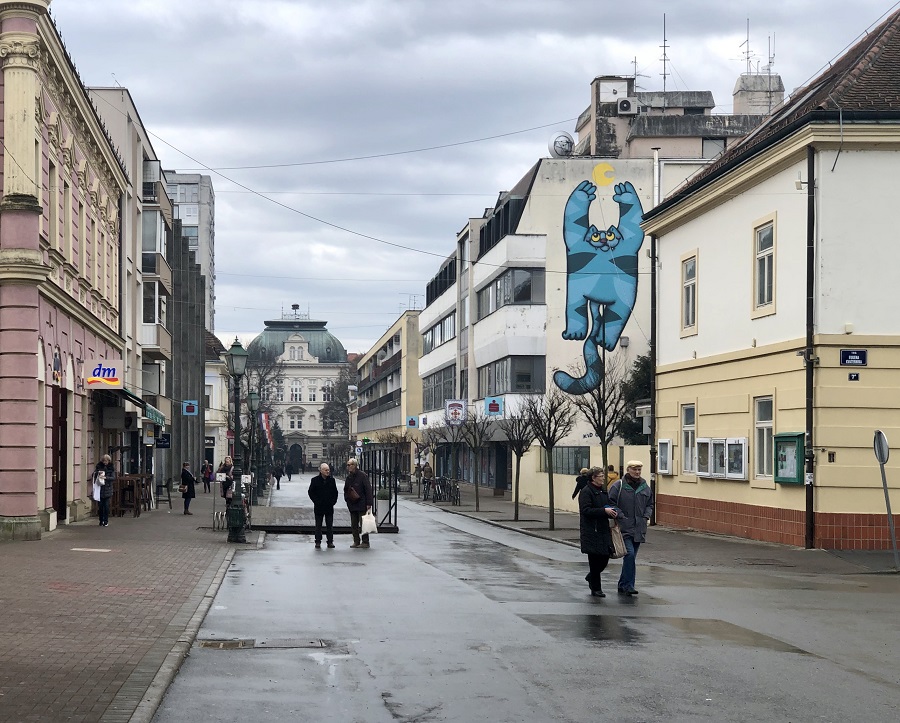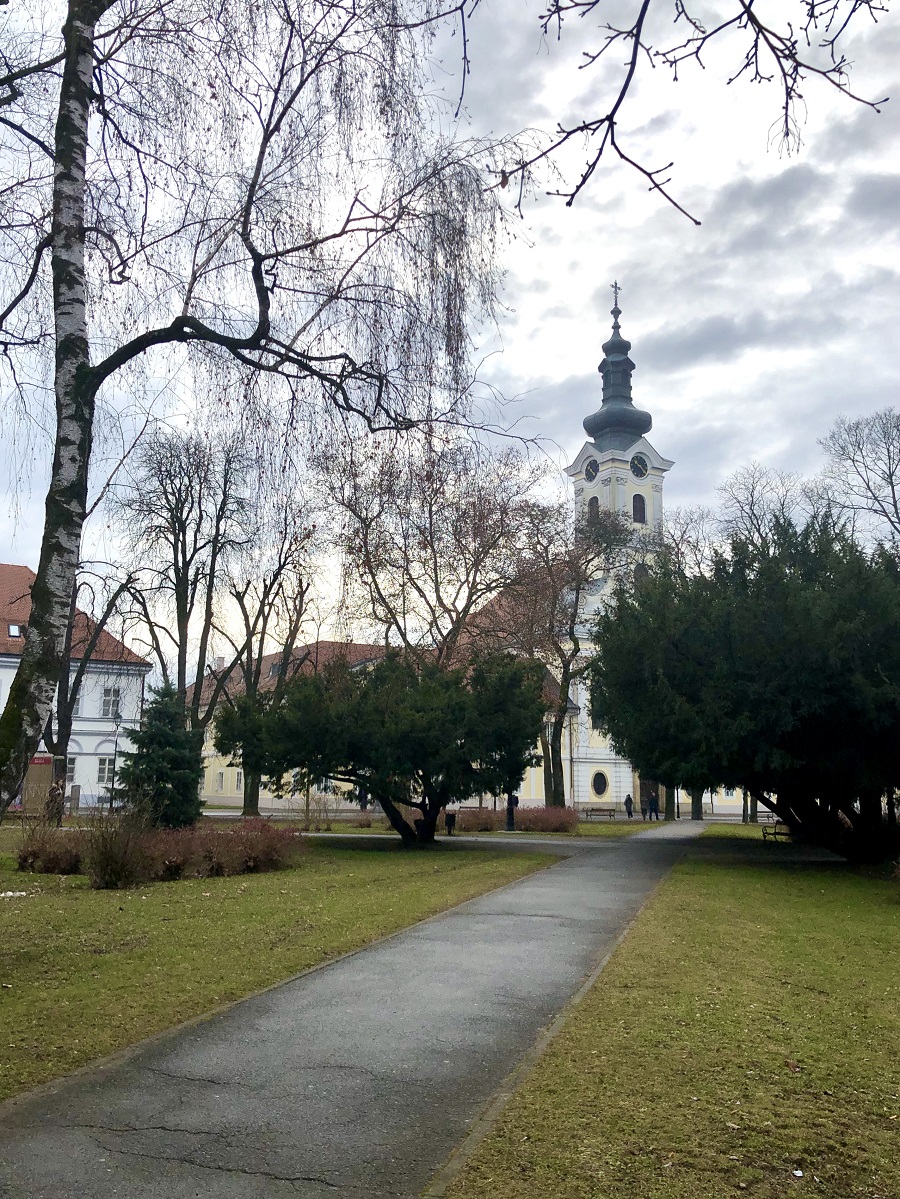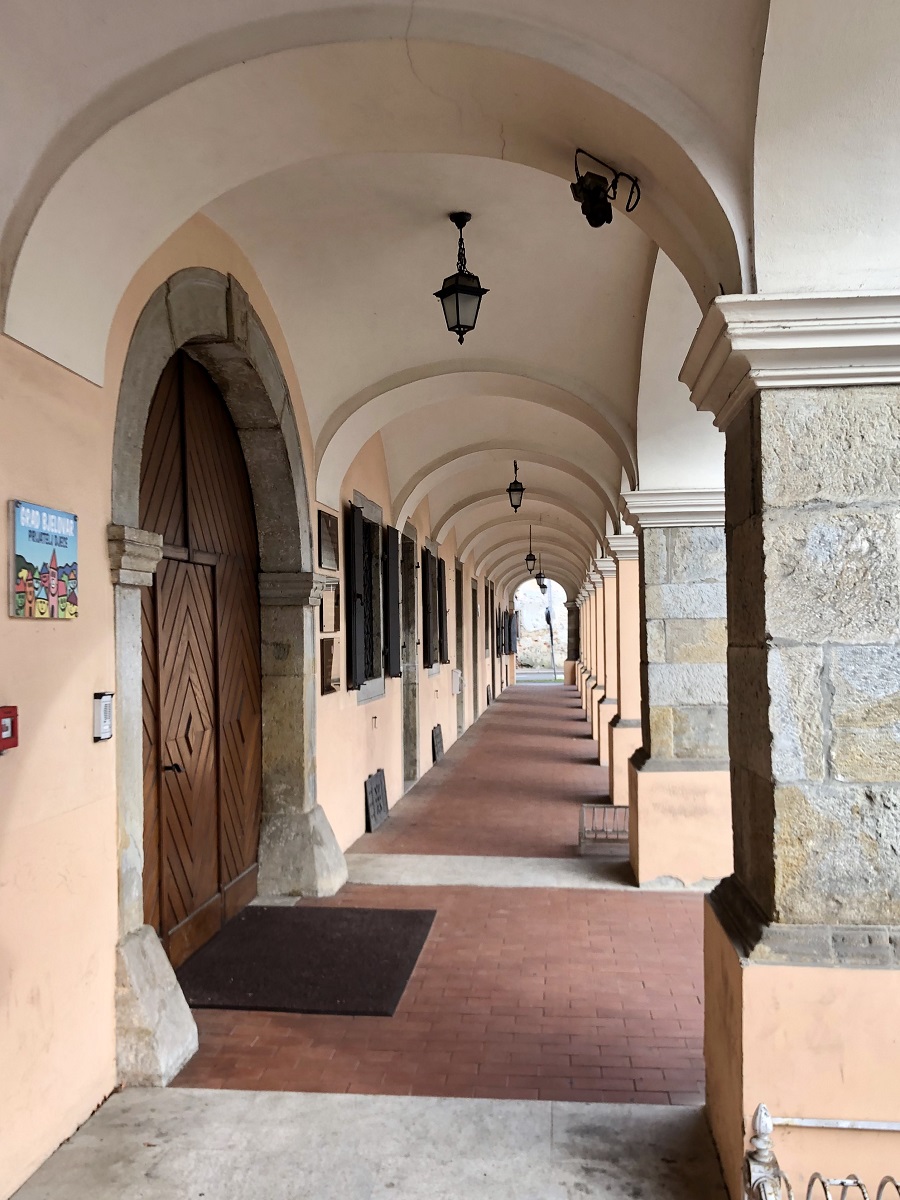PM Plenkovic: Nobody is Above the Law, End Must be Put to Corruption
ZAGREB, May 29, 2020 - Commenting on the arrests of state officials, including Croatian Forests CEO Krunoslav Jakupcic and Public Administration Ministry State Secretary Josipa Rimac of the HDZ party, Prime Minister Andrej Plenkovic said on Friday that nobody was above the law and that one had to put an end to corruption.
"I know about it from what police have reported. In any case, this is an operation of independent prosecutorial and police authorities, as it should be," Plenkovic told Media Servis, an agency specialising in making radio programmes, which published parts of its interview with Plenkovic on its web site.
"If the investigation proves that someone has committed a criminal offence, they should answer for it, regardless of their identity and party affiliation. No one can be above the law and our message is clear: An end must be put to corruption," said Plenkovic.
He added that a continued and uncompromising fight against corruption was part of his personal, his government's and the HDZ's policy.
Croatian Forests CEO Arrested for Influence Peddling
ZAGREB, May 29, 2020 - Croatian Forests management board president Krunoslav Jakupcic was taken into custody on Friday morning on suspicion of abuse of office and influence peddling, sources close to the investigation told Hina.
The premises of Croatian Forests and Jakupcic's flat are being searched, the source said.
Jakupcic is expected to be questioned at the USKOK anti-corruption office in the afternoon.
Allegedly, his arrest is part of a large operation by the Interior Ministry and USKOK, and more arrests are expected during the day.
Croatian Police Arresting State Officials, Business People for Corruption
ZAGREB, May 29, 2020 - The Interior Ministry confirmed to Hina on Friday that a number of state officials and business people were being arrested since morning on suspicion of corruption.
The police office for the suppression of corruption and organised crime began an operation early this morning in the Zagreb, Split, Knin and Gracac areas following months of investigation, ministry spokeswoman Marina Mandic said.
Sources close to the investigation told Hina that among those arrested were Josipa Rimac, state secretary at the Public Administration Ministry and former Knin mayor, and Krunoslav Jakupcic, chairman of the Croatian Forests management board.
Parliament Debates Report on Work of Anti-Corruption Council
ZAGREB, April 25, 2020 - Croatian lawmakers on Friday discussed and mostly endorsed a report on the work of the national council monitoring the implementation of the anti-corruption strategy from 15 September 2018 to 15 July 2019, which shows that the country's readiness to fight corruption declined slightly.
The Transparency International corruption perceptions index for 2018 shows a drop of one point and three places for Croatia in relation to 2017. According to the index, Croatia has 48 points, ranking 60th among 180 countries, which makes it one of the more corrupt countries.
Ante Babić of the ruling HDZ party said his party would support the report, stressing that corruption is a global problem. The national council should monitor the implementation of the action plan and insist on institutional solutions and legislation. Corruption should be identified and punished to send a message that it is not worth the trouble, said Babić.
Social Democrat MP Saša Đujić said his party would support the report, recalling "the ruling majority's assault" on the Conflict of Interest Commission in a case concerning a plane trip of a delegation of government and HDZ officials to Helsinki, the purpose of which, he said, was to shut up the commission.
Social Democrat MP Nenad Stazić warned about the problem of political corruption in the form of mutual preferential treatment of members of the same party which, he said, harmed public interest because incompetent party personnel was appointed to important offices.
In that context he mentioned Inspector-General Andrija Mikulić, who, he said, was closing down businesses that were struggling to work in the conditions of the coronavirus pandemic while failing to sanction those who sell protective masks and disinfectants at prices that were multiple times higher than before the epidemic, as well as Social Policy Minister Vesna Bedeković, who, he said, was utterly incompetent.
Stazić called on Prime Minister Andrej Plenković to replace Bedeković, just as he had replaced 14 other ministers, in order to protect people in nursing homes and he also called for replacing HDZ member Ivan Škaričić as the head of a nursing home in Split where the novel coronavirus recently broke out.
Social Democrat Gordan Maras said that the HDZ was helping Zagreb Mayor Milan Bandić stay in power and would continue doing so as long as it could benefit from it.
GLAS MP Goran Beus Richembergh said that corruption was a sophisticated integrative factor in the country, functioning all the way up from the smallest communities to big cities.
Ivan Lovrinović of the Let's Change Croatia party said that the report by the national council monitoring the implementation of the anti-corruption strategy only created the impression that something was being done to fight corruption.
Lovrinović believes that the party in power is using the fear of the coronavirus for political purposes.
Damjan Vučelić of the Živi Zid party said that both the HDZ and the SDP had turned Croatia into a kleptocracy and that the government and its satellites were steeped in corruption and crime.
He said that members of the national council were corrupt as well, which earned him a warning from Deputy Speaker Željko Reiner, who said that he should report corruption to the competent authorities if he was aware of it.
Council chair Željko Jovanović of the SDP, too, responded, warning Vučelić against making unsubstantiated claims.
Assessing that Croatia is a hotbed of corruption in Europe, Bridge MP Nikola Grmoja called PM Plenković's government the most corrupt in the EU.
He warned that corruption indicators for Croatia were growing worse by the year even though the ruling majority "is trying to downplay it."
Council chair Jovanović said that the government had supported the report and that GRECO, the Council of Europe anti-corruption body, had recommended additionally strengthening the Conflict of Interest Commission by giving it more powers to enable it to quash, in cases of violation of laws, office-holders' decisions that are found to have been made for personal rather than public benefit.
Jovanović also called for adopting an ethical code for MPs.
The parliament will continue its work on April 29.
More corruption news can be found in the Politics section.
Croatia: Council of Europe Anti-Corruption Group Calls for More Integrity in Government and Law Enforcement
Strasbourg, 24.03.2020 - The Council of Europe’s Group of States against Corruption (GRECO) has published today its fifth round evaluation report on Croatia dealing with preventing corruption in government (top executive functions) and the police.
GRECO’s report recognises that Croatia has the tools in place to promote integrity and prevent corruption in the public sector. At the same time, however, the report points to where improvements should be made, both in legislation and in practice. To start with, GRECO considers that developments in recent years have shown a need to ensure that integrity standards also apply to people working in an advisory capacity for the government. More specifically regarding members of the government, state secretaries and assistant ministers, the report calls for the adoption of a code of conduct, to be supplemented with practical guidance, briefings on the integrity rules in place and confidential counselling. GRECO further recommends that the current rules on the taking up of employment – when a person entrusted with top executive functions leaves an official position – need to be broadened and considers that the lack of rules on reporting and disclosing contacts with lobbyists/third parties that seek to influence the public decision-making process constitutes a gap. This gap must be filled in order to further improve transparency.
Similarly, requirements need to be introduced for persons entrusted with top executive functions to disclose situations in which their private interests may conflict with their official functions and to submit their financial declarations to the Commission for the Prevention of Conflicts of Interest more frequently than is currently the case. To help the Commission in carrying out its tasks, GRECO emphasises that more should be done to better enable the Commission to obtain the information it needs to verify financial declarations of government members, state secretaries and assistant ministers. In this connection, GRECO also stresses the importance of officials (irrespective of their position) showing full cooperation with independent institutions such as the Commission.
When it comes to the police, the report notes a relatively low level of trust in the police and considers that more needs to be done to prevent corruption risks within the police itself. Such efforts should start with comprehensive risk assessment of corruption-prone activities within the police, as a basis to adopt an integrity and anti-corruption strategy for the entire police force. The report furthermore acknowledges the existing code of ethics for police officers, but considers that it would need to better cover all integrity matters and be supplemented with an explanatory manual to become a truly practical tool and a reference point for the to-be-revised police trainings. Furthermore, more attention needs to be paid to the current appointment and promotion processes of police officers and their employment after they leave the police. Finally, GRECO recommends that a requirement be established for police staff to report integrity-related misconduct they come across in the police service.
The Croatian authorities are required to report back to GRECO by mid-2021 on the measures they have taken to implement the recommendations contained in the evaluation report, which will be assessed by GRECO through its compliance procedure.
* * *
The Group of States against Corruption (GRECO) is a Council of Europe body that aims to improve the capacity of its members to fight corruption by monitoring their compliance with anti-corruption standards. It helps states to identify deficiencies in national anti-corruption policies, prompting the necessary legislative, institutional and practical reforms. Currently it comprises the 47 Council of Europe member states, Belarus, Kazakhstan and the United States of America
Contact : Panos Kakaviatos, Spokesperson/Media officer, Tel. +33 6 98 37 64 04
Ex-HDZ Treasurer Says He Did Everything According to Sanader's Instructions
ZAGREB, March 10, 2020 - Presenting his defence in the Fimi Media trial on Tuesday, a former customs administration director and former treasurer of the Croatian Democratic Party (HDZ), Mladen Barišić claimed that everything he did was according to the party leader Ivo Sanader's instructions.
Barišić was presenting his defence in the trial against him for his role in the Fimi Media scandal in which money was siphoned from state institutions through the Fimi Media marketing agency.
"Everything I did as the party's treasurer was done in accordance and agreement with the party's leader. Ivo Sanader was authoritarian and did not allow any self-will and I did what I was instructed to do. I executed the tasks assigned obediently, and believed that I was working for the benefit of the party," Barišić said and added that all financial decisions could not be made by anyone but Sanader.
Barišić added that on one occasion in the presence of former HDZ officials Luka Bebić, Jadranka Kosor and Ivan Jarnjak, Sanader referred to Barišić as "his special officer and right hand man." The defendant told Zagreb County Court that he was surprised that certain individuals in the HDZ "who received extra money, for instance, some women who received allowances for clothing," were now accusing him.
The retrial of the case related to the siphoning of about 70 million kuna (almost €10 million) from state institutions and companies through Fimi Media, which came to be known as a byword for corruption in Croatian politics, was formally commented at the end of January.
From the very beginning Sanader has rejected all the accusations and has claimed that he is the victim of a trumped up political process that his successor Jadranka Kosor and the then chief state prosecutor, Mladen Bajić, launched against him.
Other defendants in addition to Barišić and who are also standing trial in this case, apart from Sanader, who was previously convicted and sentenced to nine years in prison, and the HDZ which was fined HRK 5 million, are former party chief accountant Branka Pavošević, and former party and government spokesman in Sanader's cabinet, Ratko Maček.
The owner of the Fimi Media agency, Nevenka Jurak, who was also a defendant in this case, passed away in November 2019 and the charges against her were suspended.
More news about the Sanader case can be found in the Politics section.
Former Minister Lovro Kuščević Stripped of Immunity for Extended Probe
ZAGREB, February 20, 2020 - The parliamentary Credentials and Privileges Commission (MIP) on Thursday unanimously additionally stripped former minister Lovro Kuščević of immunity at the request of the Office of the Chief State Prosecutor (DORH), which has decided to expand its investigation into him.
The decision paves the way for the USKOK anti-corruption office to launch criminal proceedings against Kuščević on the suspicion that he committed the crimes of taking a bribe, abuse of position and authority, incitement to abuse of trust in business activities, and incitement to causing a business to go bankrupt, MIP chairman Žarko Tušek explained.
In September 2019 Kuščević was stripped of immunity to allow criminal proceedings to be launched against him for two crimes of abuse of position and authority, however, as DORH has expanded the investigation, parliament was once again requested to strip Kuščević of immunity.
During his term as the mayor of Nerežišća on Brač island, Kuščević initiated amendment of the municipality's physical plan and repurposed his barn into a house as well as unlawfully enabled his brother-in-law to buy a government-subsidised flat.
USKOK has now extended the probe to include Kuščević's spouse and a business man from Split.
According to media reports, USKOK suspects Kuščević of not only rezoning land but of illegally gaining HRK 1.4 million and defrauding the state budget of about 300,000 kuna.
He is also charged with taking a bribe and the charge also refers to his brother-in-law Ivica Žuvić and businessman Ante Marinović.
USKOK believes that a plot of land on Brač island, registered as belonging to Žuvić, is actually owned by Kuščević and that Kuščević received it as a bribe from Marinović.
More corruption news can be found in the Politics section.
Sanader Once Again Pleads Not Guilty in Fimi Media Corruption Trial
ZAGREB, February 11, 2020 - The former prime minister and leader of the Croatian Democratic Union (HDZ) party, Ivo Sanader, on Tuesday once again pleaded not guilty in a retrial in the Fimi Media corruption case, in which he, the HDZ and former party leaders stand accused of siphoning money from state institutions and companies between 2003 and 2009 .
"I am not guilty. I very resolutely reject all the allegations in the indictment which is based on fabrications," Sanader said at Zagreb County Court.
The case was launched ten years ago. Sanader is currently serving a six-year sentence for one of a series of scandals he was involved in.
The retrial for siphoning some 70 million kuna (about €10 million) from state institutions and companies through the Fimi Media marketing agency, a case that has become a synonym for corruption in Croatian politics, was formally launched at the end of January.
All the accused, including the HDZ party and the party's leadership at the time pleaded not guilty of siphoning money into a party slush fund. In the initial trial, which opened in April 2012, Sanader was convicted in 2014, but the Supreme Court overturned the ruling on appeal in 2015.
A retrial which commenced in 2016 was suspended as one of the accused, Nevenka Jurak, who was the owner of the Fimi Media agency, fell ill in July 2018 when Sanader was to have presented his defence. Jurak passed away in the meantime and the trial was suspended.
More news about Ivo Sanader can be found in the Politics section.
Lovreć Municipal Head Relieved of Duties
ZAGREB, February 9, 2020 - Public Administration Minister Ivan Malenica said that the term of Anita Nosić as the head of the southern municipality of Lovreć ceased as soon as she changed the place of residence to buy a socially-subsidised flat in Zagreb through the Real Estate Agency (APN).
Nosić's deputy will be now in charge of the municipality, said Malenica.
Malenica's comment ensued after media outlets reported that Nosić, a member of the HDZ party and head of Lovreć municipality in Split-Dalmatia County, had bought a socially-subsidised flat in Zagreb and also changed the place of residence.
Even though she continued to live in her family home in Lovreć, Nosić registered permanent residence in Zagreb on 10 December 2018, more than a year after signing a housing loan agreement with the Croatian Postal Bank (HPB). This automatically disqualifies her from being the head of the municipality where she has no longer the registered place of residence, under the Act on Local Elections.
Media speculate that Nosić risks a criminal report as she has unlawfully served as municipal head for more than a year.
More politics news can be found in the dedicated section.
Seeds of Change: My City is Corruption-Free, Claims Croatian Mayor
January 29, 2020 - Is change really possible in Croatia, a society where corruption is rife wherever you look? Meet Dario Hrebak, the dynamic young Mayor of Bjelovar, who believes not only that it is possible, but that his city is free of corruption.
Living on Hvar for 13 years, eastern Croatia was for many years a total mystery. The only places that you ever heard about were Vukovar and Osijek, and I maintain that many people living in Croatia today only have a very sketchy understanding of what there is to see and do once you head east of the capital. Which is a pity, for people are really missing out. As we reported late last year, you can have an awful lot of fun heading on east for a weekend.
Over the years, my knowledge of the east has improved considerably, but there was still one sizable town that I knew almost nothing about, one which I could not with certainty place on the map.
Bjelovar.
A city of more than 40,000 people, I knew almost nothing about it apart from the fact that its handball team had once been the Kings of Europe almost 50 years ago. But Bjelovar has been very much on my radar in the last few weeks, as so many people told me the same thing when I asked them for examples of non-corrupt politicians in Croatia, and for examples of good governance at the local level. Of politicians serving the public good rather than linking their own pockets.
Dario Hrebak, the Mayor of Bjelovar, Member of Parliament, and President of the HSLS Liberal Party.
The stories I was hearing were scarcely credible in the modern Croatia. His was the first local administration in Croatia to introduce digitalisation, whereby certain services could be done online more efficiently and comfortably than having to queue and take up an official's time for a function that could be done online without human interaction. All the costs of the administration became publicly available, even down to the cost of a lunch on official business. As part of the efficiency drive, he is the only mayor to reduce the staff of his administration - by 10% - with another 10% in the pipeline by the end of his mandate. And while he could not control taxation at the national level, he slashed local tax from 12% to 6%, with a plan to take that down to zero by the end of the year. The result? More than 250,000 kuna MORE in the administration's bank account in the first 17 days of 2020, compared to the same time last year.
Digital, transparent, pro-business and entrepreneurship, not afraid to tackle the waste in the administration. All this happening in modern, corrupt and unreformable Croatia. Could this Dario Hrebak be an agent of change? I had to meet him.
He responded promptly to my text message, complimented me on TCN which he knew well, and invited me to visit him in Bjelovar.
It was quite a meeting.
"Meetings, meetings, meetings," he began warmly, clearing the folded daily newspaper from his desk. "So many meetings and no time to even read the morning newspaper headlines."
"But you had time for your morning coffee, surely? Croats cannot function without their coffee," I replied.
"Well, no, not even that, as you can see - just this half-finished mug of tea."
It quickly became apparent why there was no time for newspapers and cups of tea in the world of Dario Hrebak - he was a man on a mission, extremely focused on his objectives and next moves. An active member of liberal parties for more than 15 years, including the European Liberal Youth movement, through which he travelled extensively, picked up best practices from other countries, and widened his mindset beyond the more socialist upbringing of his peers in this post-Yugoslav state, Hrebak had clearly had enough of corruption and was determined to introduce a regime of transparency and progress in his city.
These are words that one hears a lot in Croatia, but they are not followed up on.
Bjelovar and Dario Hrebak are different. Here's why.
Of the many obstacles to real change in Croatia, one of the most intransigent is the relationship between voters and those in power. Those in power depend on getting enough votes to continue their private gains from the public purse, and they will do anything to stay in power. This includes giving jobs of little or no value to unqualified but loyal people. A job for life in exchange for a vote for life. Or rather votes for life. If the father has a nice job in the administration in this sea of unemployment, all the other voters in the extended family are going to make sure it stays that way come election time. This is not a practice unique to Croatia, of course, but it has become an art form, and until that cycle is broken, real change will not be possible, bloated administrations will continue to grow, more war veterans will be added to the list, and taxes will have to rise so that the shrinking number of honest workers and entrepreneurs can contribute the money to pay for all this.
It would be political suicide to mess with that system. Reducing benefits, abolishing unnecessary jobs, thereby cutting those previous jobs and risking the multiple votes in the process.
Dario Hrebak is attempting a full-frontal assault on the system, betting that efficiency savings, better quality of life, transparency, economic growth and real jobs will win the day.
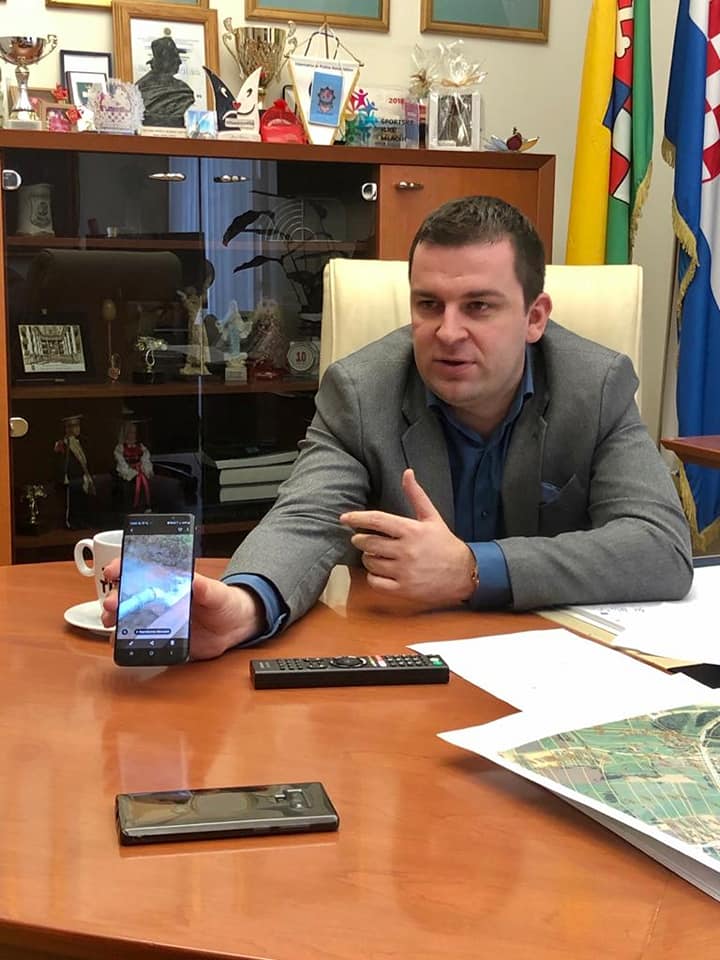
He has made a very impressive start, as the numbers show. When he started, his budget was 130 million kuna, then 148 million in 2018, 180 million last year, and it will be over 200 million this year. As the income grows, he wants to keep the expenditures on the same level, while pouring the surplus revenue into tax reductions, projects, and stimulating the economy. Bjelovar was bottom of the list for extracting EU finds when he started, now it is in the top 10 towns in Croatia.
His small digital revolution is still largely in beta mode, but there are already concrete results, and he gave me a couple of examples. The monthly payroll used to take the employee three days to perform. Now, with much of it digitised, that process is performed in just three hours.
There are now ten concrete services that can be performed online via the dedicated app which has been created. New-born babies are entitled to 1000 kuna from his administration. Previously, that would have involved a visit to the office from the young mother, forms to be filled in, another meeting, period of checking and approval, and so on. Now that can all be done from home online, without all the stress of taking the young child around the famous Croatian bureaucratic system.
The plan is to put almost all services online in the same way. Quicker services, less public administration needed, more efficient procedures, and all without the need to leave the house and queue to get the blessing of a grumpy official.
Standard practice in countries like Estonia. Absolutely revolutionary for Croatia.
One of the first acts he did as mayor was to cut social welfare where it was not needed. Bjelovar has an unemployment rate of 6%, around 200 people. Rather than continue with the generous benefit for the unemployed, he announced that he would be happy to pay it to those without a job who reported for work at his administration, where they would be put to work as required. Of the 200 contacted, just four showed up for work, which meant that 196 had their benefits cut. More money in the administration's budget, less cash simply given to people who did not want to work. More votes under threat as vested interests are challenged.
"If someone genuinely needs help, an operation or something, then the city is ready to help absolutely," said Hrebak. "But why should the city cover someone's laziness? This whole system was created by HDZ and SDP, which are both social parties. We have literally made invalids out of people. Sadly, the most important question in Croatia today remains - are you left or are you right?"
The mayor is putting a lot of faith and investment into IT and attracting foreign investment. There is a tax-free model for foreign investors regarding local taxes (he cannot influence tax policy at the national level) - land for one kuna, communal tax one kuna, communal contributions one kuna, free space, electricity and other utilities. Bjelovar has the biggest startup contest in Croatia, with prize money of 100,000 kuna, and judges from the entrepreneurial and banking worlds. The University of Bjelovar's first IT graduates have all found employment.
And the investors are coming. TCN recently reported on the first geothermal power plant in Croatia, which was built by Turkish investors with an investment of over 40 million euro under a concession. Hrebak says the return on investment will take just six years, and also that there are other thermal water sources which can provide three more plants. His plan is to build a spa in one of these locations with city money, then find an investor to build the second hotel the town so badly needs. It will be located just 50 metres from the exit of the new stretch of motorway which will open in 2-3 years - and eventually connect Bjelovar with Budapest, making this an attractive spa stop for Hungarians heading to the coast.
He is disappointed, but not surprised, that no other town has followed his lead, despite many fine words about fighting corruption.
"I know 5-6 young mayors, and I am sure that they are not corrupt. But despite the words, they have done nothing. The reason is the system - they are scared of losing those votes which will cost them power. This is the cycle we have to break in Croatia, in order to progress."
"This is a long, long fight, a marathon. The only way to make this change is through patience and persistence. We will keep on trying, delivering excellent services, cutting tax and administration, and providing the best incentives for foreign investment. We are small, with just 1% of support, but we are trying. My city is corruption-free."
And, as he went to take a first sip of the cup of tea that he made several hours ago, I concluded that I for one would not bet against Dario Hrebak expanding his digital and transparent revolution far beyond the borders of Bjelovar, especially if international institutions and the EU took a greater interest and offered support.
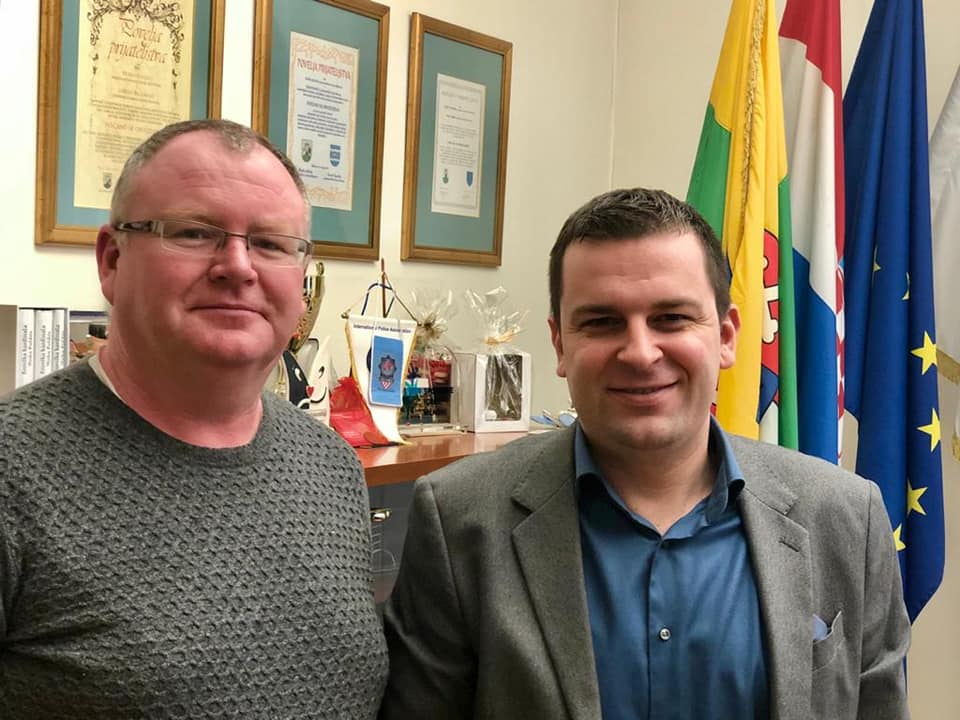
it is a topic we will be returning to very soon. For the very latest from Bjelovar, check out the dedicated TCN section.


